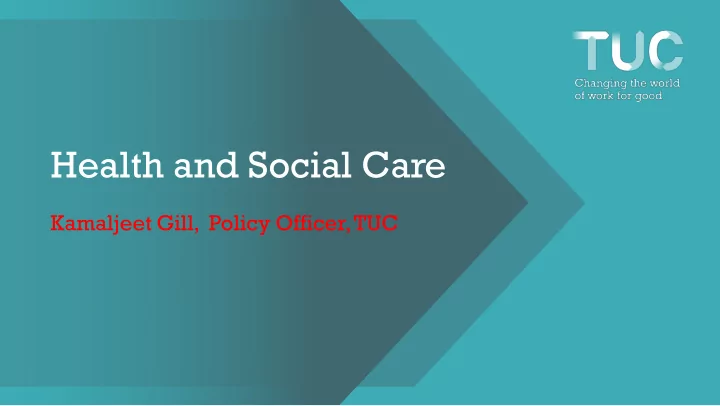

Health and Social Care Kamaljeet Gill, Policy Officer, TUC
The story so far…
What effect is this having on Health and Social care? NHS Staff are being pushed to breaking point: • two thirds of staff had used financial products or made a major change to their standards of living over the last year. • Seventy-three per cent of those had asked for financial assistance from family or friends; • 20 per cent had used a money advice service, • 17 per cent had pawned items, • 16 per cent had used payday loans and just over 200 respondents had used a food bank in the last year.
Services are also suffering OBR are forecasting the following funding gaps
In their latest quarterly monitoring report the Kings Fund found:
This is not a one-off: • 51 per cent of finance directors and 59 per cent of CCG finance leads felt that patient care has worsened in their local area in the past year • In the first half of 2017/18, the proportion of patients waiting more than four hours from arrival to discharge, admission or transfer in all A&E departments was almost 10 per cent – the target of treating 95 per cent of patients within four hours has not been for three years. • Ambulance call out targets have been missed for 26 consecutive months. • The proportion of patients waiting more than 18 weeks to begin their treatment rose to more than 10 per cent, a target has been breached for 18 months now. • In August 2017, 5,809 patients were delayed in hospitals – an increase of almost 50 per cent since 2011.
Social Care is not faring much better
Mental health services are struggling In England: Rest of the UK: • 62% of mental health trusts (34 out of 55) • In Scotland, there was less money spent at the end of 2016-17 reported lower by health boards on mental health in 2016- income than the amount for 2011-12 17 compared to 2009-10 in real terms • Only one trust saw their income rise all • In Northern Ireland, mental health five financial years investment by the Health and Social Care Commissioning Board in real terms is • Nine mental health trusts saw their income down on where it was two years ago fall all five years, including three in Yorkshire and Humber • In Wales, mental health investment in real terms is lower than it was in 2010-11
More funding is essential…
But not enough
Current problems are not new
People are living longer…
But there are consequences
Current care funding is abrupt and punitive
Dilnot was progress
Government have embraced the Cap
But we can do better Costs cap does little for workers in industry Is of little help if you don’t have the initial resources spare to fund your / a loved one’s care. Still relies on the private sector, so we would still be vulnerable to collapses like Southern Cross. Does nothing about the debt and dividend model that drives most care providers. Which sees huge proportion of funding siphoned off + is very unstable.
The case for integration
A national health and social care service: Would make social care provision more affordable for many ▪ Would make provision more secure and responsive to need ▪ Would improve conditions for workers in the sector ▪ Would allow innovation, coordination and collaboration with rest of health service ▪
How do we afford this? 1 – General taxation Age UK state to restore social care provision to 2010/11 levels requires: - funding of £2.57bn more than current levels in 2015/16 - £4.45bn more than current levels by 2020/21.
How do we afford this? 2 increased demand
How do we afford this? 3 increased taxes Petrol, Average Weekly Earnings (2008 =100) 130 120 110 100 90 80 70 60 2010 2011 2012 2013 2014 2015 2016 AWE Petrol
How do we afford not to? How do we not? The costs of collapse, or even of limping on with status quo are drastic The effects of increased life-expectancy alone will make it less and less sustainable to maintain a division between health and social care It is the most sustainable and humane option.
Recommend
More recommend